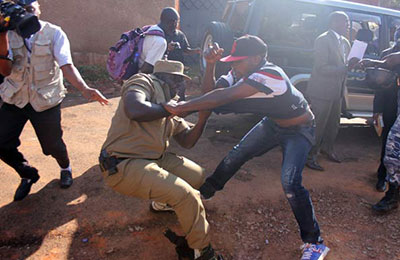Getting rid of an influential opposition figure is a simple two-step process for Uganda’s ruling party, the National Resistance Movement: Dismiss the opponent and ensure the press cannot cover it.
Over the past month, Erias Lukwago, who is the popular but embattled Lord Mayor of Kampala and an opposition party member, has faced impeachment, has been denied access to his office, and has been placed under house arrest.
On November 25, Uganda’s city council, the Kampala Capital City Authority (KCCA), voted to impeach the mayor on charges of misconduct and incompetence. Lukwago denies the charges and says they are a political ploy to remove him, according to news reports.
Uganda’s High Court struck down Lukwago’s impeachment, but police placed the mayor under house arrest, and the city council refuses to re-instate him in spite of the court order, local journalists said. Parliament objected to the fact Lukwago was denied access to food while under house arrest, an allegation Kampala Police Spokesman Ibin Ssenkunbi denied, according to news reports. Eventually released after a week, the council continues to block his office and Kampala’s city government remains in limbo, local journalists told me.
It’s a big story that Uganda’s press corps is hard pressed to cover.
On November 25, police blocked an estimated 20 journalists from accessing City Hall chambers during the impeachment process without giving a reason, local journalists said.
The Ugandan Journalist Union claimed three journalists working at privately owned Radio One and sister radio station Akaboozi were dismissed recently for reporting about the mayor. The administration at the station denies the allegation.
Earlier, on November 5, Kampala Resident City Commissioner Samuel Hashaka issued a letter warning Radio One and Akaboozi to stop covering opposition politicians. “This is to inform you that I have noted that Akaboozi and Radio One are increasingly being used to deliberately tarnish the image of government, KCCA, and to frustrate government programs,” the letter read.
Hashaka’s complaint came a day after Akaboozi hosted Lukwago on its mid-morning show. “If you must host a person tarnishing the image of government or KCCA, you should at least co-host somebody to diffuse the lies,” Hashaka wrote.
Local journalists say radio hosts routinely invite ruling party members to their live debate programs without success. “When you ask them to participate in a live debate program they will tell you that they are coming, but they never show up,” said Kisuule Richard, the presenter at Top Radio, a Christian station. “At the end of the day you are stuck solely interviewing an opposition member since they made the effort to appear.”
The lack of ruling party coverage over the airwaves may have prompted Information Minister Rose Namayanja to order all broadcasters in October to provide four hours of free airtime for government programs, news reports said. “There is need to provide free airtime so that various government officials talk about and interact with the public on national issues,” she was quoted as saying. So far, broadcasters have ignored the directive and the National Association of Broadcasters has labelled the order as economically untenable, the same reports said.
Top Radio’s Richard, popularly known as “Kamagu,” is fully aware of the consequences of interviewing an opposition politician. Police stormed Top Radio and blocked him from interviewing Deputy Mayor Sulaiman Kiddandala, also an opposition member, just minutes into the broadcast. “I was just at the introductory part of his story,” Richard said. “They were scared, so they came in and stopped the broadcast.”
Uganda’s Media Crimes Police Unit Commissioner Simon Kuteesa told me Richard was arrested on charges of inciting the public, but the public prosecutor recommended the charges be dropped and forwarded to the state-controlled Media Council of Uganda. Despite two days of detention, Richard says he is determined to continue telling the mayor’s story. “When you write about the mayor, they intimidate you with repeated phone calls, so many are avoiding the story, but we keep discussing the issue,” he said.
And Richard is not the only one. Social media is awash with Ugandans discussing the Kampala mayor via Facebook and Twitter. The more a story is blocked from the public the more the public and press want to know the story. Uganda’s many news sources and intrepid reporters will continue to inform the public no matter what efforts emerge to block coverage or enforce government narratives.
